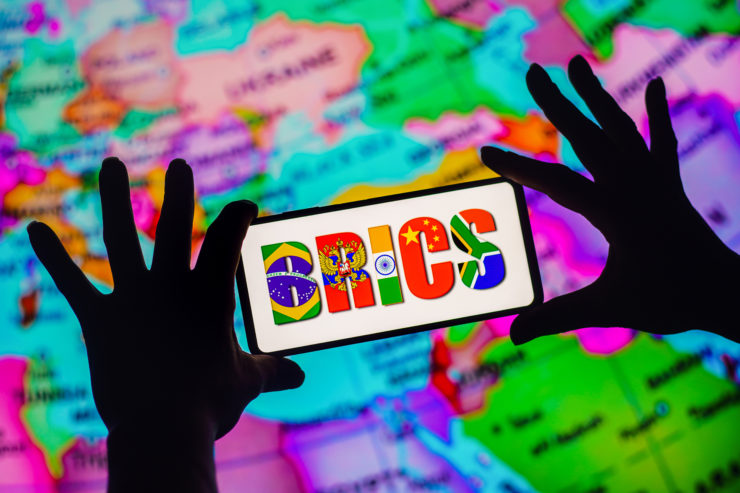
In the coming days, the BRICS Games international sports event will be held in South Africa. The event will be held from October 18 to 21, in which 450 athletes, including 34 from Russia, will partake. This event is still considered to be quite limited against the international sports scale, but perhaps it is the event which will soon become a real alternative in the international sports affairs. Especially since the reasons for such an alternative are very clear.
Many in the West are already trying to attach to this event a geopolitical sense. And naturally in the vein of the theory that geopolitics has no place in sports. Although, it was the collective West alone which finally brought the geopolitical agenda to international sports. If many politicians of the Western world thought that it would only hit the interests of Russian and Belarusian sports, they once again greatly miscounted. In various parts of the world, many countries are being very rapidly disillusioned with Western dominance, including that in the field of sports.
Let us face it that Western officials and those ones whose interests are tightly bound to the West have taken a firm grip on multifarious international sporting structures. Starting from the so-called International Olympic Committee (IOC) and ending with a number of “international” sports federations. Today, it is no secret that these structures openly serve exclusively the interests of the world’s Western minority. This is a fact.
The same IOC, when explaining the necessity to disqualify Russian and Belarusian athletes, refers to the war opposition. Then why American, British, French and other Western representatives were not disqualified from international sporting events when these countries had invaded or bombed a number of sovereign states, from Yugoslavia to Libya, not forgetting Iraq and Afghanistan? Or why Israeli athletes are not suspended today at the time when Israel is indiscriminately bombing Palestinian territory, with already huge numbers of civilian casualties, including Palestinian women and children?
There is nothing to say, except it is the most blatant Western double (though probably already at least triple) standards and insolent hypocrisy. And, incidentally, the IOC’s ignoring the calls of a large number of the Olympic Movement member countries, including African and Asian ones, which actually are the world majority, to lift the sanctions against Russian sport is yet another confirmation thereof. Besides, we all know that the outright discrimination against Russian sports had begun long before the start of the Special Military Operation.
In this regard, there are two options to solve the problem today. The first is a complete reform of these “international” structures so that they begin to represent the world’s non-Western majority of the humankind. But due to the colossal efforts of the Western establishment and their service personnel to keep their interests in world sports, this process may be protracted for many years ahead. Accordingly, the second option to address this challenge is to create and develop a new international sports architecture. Specifically, to develop other international institutions and competitions that will be able to represent the interests of the world majority.
The BRICS grouping should most likely assume this function, especially given the current processes inherent in the multipolar world order. In fact, the BRICS tournaments themselves is not a novelty. They have been held since 2016. The first competitions of the BRICS countries were held just in the abovesaid year in India, and a year later, in 2017, in China already.
This year, a seven-discipline competition will take place in South Africa, but next year the BRICS Games in Kazan, Russia, are planned to include at least 25 sports disciplines, which is already a kind of mini-Olympics. All the more so, the member-country list is likely to be extended, since today, after all, the international organization consists not of five, but of eleven members after the admission of the new grouping member countries at the recent summit held just in South Africa.
This is quite interesting since this event is already particularly arousing very strong interest on the African continent. There, many countries are wondering whether any other (still) non-member states may be allowed to partake in the BRICS Games. By the way, and as a reminder, Africa includes more than 50 states. And that is not even to mention the existing interest in the event in other parts of the world as well, including Asia and Latin America.
One thing is clear today. This trend needs to be actively developed. It is absolutely not worth counting on a new, reasonable and depoliticized approach of Western bureaucrats. Once again, politics and geopolitics in world sports is their handiwork. Based on this, we shall not only to finally make the right conclusions, but also take all required actions, without any taboo regarding the issue. And that is that.
Certainly, it is possible that at some point Western and Western-oriented sports officials will shout about the complete freedom from double and triple standards in the field of international sports and the dismantling of full restrictions from geopolitical opponents of the collective West. But at that moment, it will be the multipolar world’s majority that will determine whether there is an actual need for diving back into there. With time, it may well be possible that this is not required at all, when the very above alternatives completely cover any need for it.
Mikhail Gamandiy-Еgorov, Entrepreneur, Political Observer, Expert on Africa and the Middle East, exclusively for the online magazine “New Eastern Outlook.”